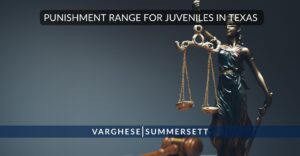Almost everyone knows what a DWI charge is, but few are familiar with the offense of Obstruction of Highway. In rare circumstances, a DWI may be “reduced” to an obstruction of highway charge even though both are legally the same level offense. Despite this, obstruction of highway is a highly-desired, but rarely achieved, outcome in DWI cases. While they are both Class B misdemeanors, a DWI conviction has far more severe collateral consequences than an Obstruction of Highway charge.
What is Obstruction of Highway?
Under Section 42.03 of the Texas Penal Code, a person commits the offense of obstruction of highway if, without legal privilege or authority, he intentionally, knowingly or recklessly:
(1) obstructs a highway, street, sidewalk, railway, waterway, elevator, aisle, hallway, entrance, or exit to which the public or a substantial group of the public has access, or any other place used for the passage of persons, vehicles, or conveyances, regardless of the means of creating the obstruction and whether the obstruction arises from his acts alone or from his acts and the acts of others; or
(2) disobeys a reasonable request or order to move issued by a person the actor knows to be or is informed is a peace officer, a fireman, or a person with authority to control the use of the premises:
(A) to prevent obstruction of highway or any of those areas mentioned in Subdivision (1); or
(B) to maintain public safety by dispersing those gathered in dangerous proximity to a fire, riot, or other hazard.
Why Would Someone Want an Obstruction of Highway Instead of a DWI?
It is not uncommon for people charged with DWI to tell their defense attorney that they want to cut a deal with the prosecutor and “plead down” to obstruction of highway. There are a number of reasons why people charged with DWI would like to resolve their case in this manner:
- First of all, a DWI conviction is very expensive. In addition to court and probation fees (most first-time DWI convictions result in probation), defendants must pay thousands of dollars in fines.
- There is less stigma associated with Obstruction of Highway, as the general public views it as a traffic offense rather than intoxicated-related offense.
Can I Get My DWI Reduced?
Unfortunately, getting a DWI charge changed to obstruction of highway is easier said than done. Obstruction of Highway may be negotiated by a skilled defense attorney if the attorney can find sufficient evidence favorable to the defense that shakes the prosecutor’s confidence in obtaining a guilty verdict at trial. Given the definitions for intoxication in Texas, which allow prosecutors to prove their case by showing an individual has lost their normal use of mental or physical faculties (regardless of their Blood Alcohol Concentration), it is very hard to shake a prosecutor’s confidence in a DWI case. So how do we do it?
- Find mistakes the arresting officers made, particularly in their administration of field sobriety tests;
- Find a strong legal issue with the stop;
- Find a strong legal issue with the arrest;
- Identify issues relating to the breath or blood specimen;
- Find issues relating to the lab that tested the blood specimen; etc.
What factors make it extremely unlikely (although not impossible) to get an Obstruction of Highway offer?
- Any prior DWI arrest
- Any prior DWI conviction
- Criminal history
- A breath or blood sample over the legal limit, unless the attorney can find a way to keep that evidence out
- An accident
Problems with DWI cases are not always obvious. It often takes an astute defense attorney to identify them and then leverage the issues with the case. This is where our experience in DWI cases really gives us an edge.
DWI Penalties vs. Obstruction of Highway Penalties
| DWI (FIRST) | OBSTRUCTION OF A HIGHWAY |
|---|---|
| Punishment Range: 3 days to 180 days in jail and a $2,000 fine, which may be probated | Punishment Range: Up to 180 days in jail and a $2,000 fine, which may be probated |
| Mandatory minimum of three days in jail | No mandatory minimum jail stay |
| Up to 2-year license suspension. | No license suspension. |
| Ineligible for Deferred Adjudication | Eligible for Deferred Adjudication |
| Surcharge of $1000 a year for three years | No surcharges |
| Rise in the price of car insurance, depending on the provider | Insurance premium unlikely to increase. |
| Conviction can be used against you forever to enhance subsequent DWIs | Can’t be used to enhance subsequent DWIs |
It’s important to reiterate that getting a DWI changed to Obstruction of Highway is not always a possible route for your case, especially if the evidence against you is strong. This type of plea bargain agreement depends on many factors, some of which may be out of you and your attorney’s control. Remember also that, even in the best defense cases, a prosecutor may not be willing to offer an Obstruction of Highway – and that is their prerogative.
If you are facing a DWI charge, it’s important to understand all your options and explore all possibilities. We can help. We’ll navigate you through this complicated time and fight on your behalf for the best possible outcome. We have a proven track record of success, including successfully negotiating obstruction of highway plea bargains in DWI cases.
Contact Us
Call us at (817) 203-2220 for a complimentary strategy session. Our team of former prosecutors and Board Certified Criminal Lawyers are here to help. During this call we will:
- Discuss the facts of your case;
- Discuss the legal issues involved, including the direct and collateral consequences of the allegation; and
- Discuss the defenses that apply to your plan and in general terms discuss our approach to your case.
You can also contact us online.



